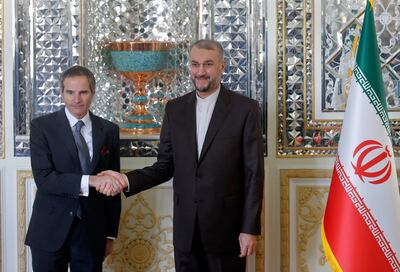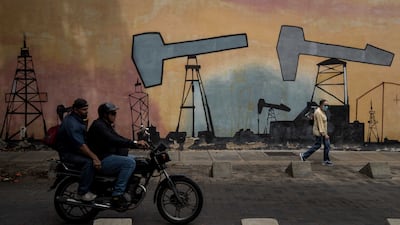The Ukraine conflict is having a profound impact on the global order, with relations between various countries changing at a rapid pace and with consequences.
Moscow, it seems, believed that the war would help Russia in mobilising its allies into forming an anti-western bloc. Such a thing has failed to materialise. Worse, from the Kremlin's viewpoint, the West has broadly stood together and applied some of the most stringent sanctions that, within days, have crippled the Russian economy.
A wedge has emerged between Russia and its ally Iran, with the Ukraine war having an impact on the talks being held in Vienna to revive the 2015 nuclear deal between the global powers and Tehran. Until recently, Moscow was the main advocate of Iranian interests in Vienna. Today, Tehran is reportedly irked by Moscow's move to link the war to the negotiations, which Iran wants to conclude as quickly as possible so that western powers lift their sanctions on its economy.
The Ukraine crisis has added a vital element to the equation: Iran's oil and gas, which could serve as additional resources in the international markets after the US banned its oil and gas imports from Moscow. The Biden administration has initiated talks with Iran in this regard, with the latter's response being that it is ready to export its resources as soon as the aforementioned sanctions are lifted. It is, effectively, calling on Washington to conclude the Vienna talks quickly.
The Biden administration as well as governments in key European countries, too, are seeking to seal the deal with Iran. The former, because it needs a victory before this year's midterm election; the latter, because it seeks alternative energy suppliers as it attempts to wean itself from Russian hydrocarbons.
Yet, European countries aren't speaking with one voice on the matter. Germany, Hungary, Italy and the Netherlands are among those that are heavily reliant on Russian energy and for whom it will take months to transition away from Moscow's supplies. The EU, meanwhile, is seeking to reduce reliance on traditional energy sources to one third of the current level by the end of 2022.
While Iran potentially stands to benefit from this move, Russian negotiators are said to have sought a guarantee from the US that it will not sanction Iran in the future; Moscow's thinking seems to be that preventing future sanctions on Iran would help Russia sell its oil through Iran.
It appears that Iran has, for now, determined that its interests lie with the US and Europe, although it is clear it won't forgo its strategic alliance with Russia. This pragmatic approach, Tehran seems to believe, will help its regime to better pursue its strategic objectives.

How this affects security in the Middle East, it's too early to tell. It is likelier than not that Iran will seize the opportunity to finance its regional expansionist projects. Logically, a potential pivot to the West should help to curb its destabilising policies in the region. But it is possible that the Iranian regime and the Biden administration will sign accords that end up legitimising Tehran's gains in Syria, Lebanon and Iraq.
China, Russia's other ally, has also hedged rather than going all-out in its support for the Ukraine war. Its equation with Kyiv means that peace in the region is in Beijing's interests. China has made it clear to the West that it does not appreciate Nato's eastward expansion over the past three decades. It has also abstained in the UN votes to deplore Russia's operations inside Ukraine, but it has not thrown its wholehearted support behind Moscow either. And it's unlikely it will risk being sanctioned by the West for the sake of showing solidarity with Russia.
Even Venezuela, which for years has pushed back against American influence in South America, is now responding positively to recent US efforts to build ties. With the Biden administration eyeing Venezuela's large energy reserves, it might consider lifting sanctions on Caracas as well as ending its international isolation.
The US isn't just reaching out to its so-called adversaries for solidarity and energy. The Biden administration is attempting to improve tense relations with Washington's allies in the Gulf, too.
US-Gulf relations have been strained slightly by the current administration's policies in the Middle East, including its going out of the way to reset its equation with Iran, which poses a security threat to the region at large, and its decision to remove Yemen's Houthi rebels from its terror list last year. While the US is considering putting them back on the list following the Houthis' attacks on Abu Dhabi earlier this year, no action has yet been taken.
But the Ukraine crisis could lead to a reset in relations, especially bearing in mind that the Gulf states have deepened their respective ties with China and Russia in recent years. A reset, together with an increase in oil prices, could further increase these countries' influence in international decision-making process. They are already responding to the Ukraine war and its fall-out with great maturity and pragmatism – and are, therefore, likely to consider renewing their respective bilateral relations with the US.
Even a few weeks ago, few could have predicted that the world order would be reshaped in so drastic a manner so quickly. But with the war unlikely to end anytime soon, as Russian forces continue to double down inside Ukraine, we can expect still more twists in the tale.


